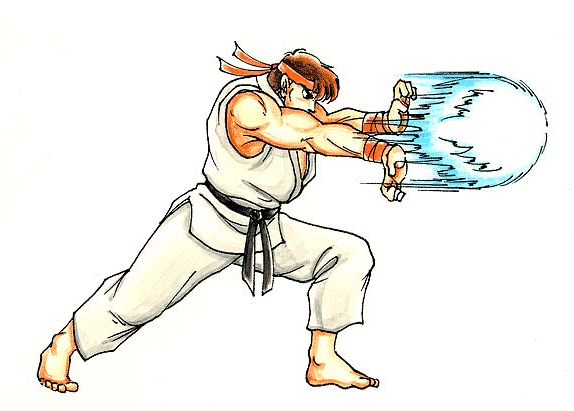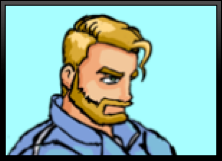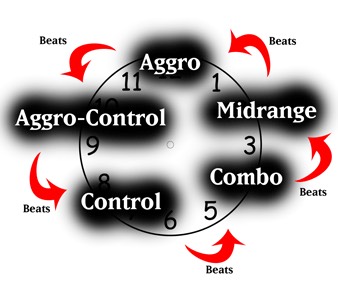Skill Gap, Player Types, and Street Fighter
This is by far the best SF-related video I have seen in some time. Thoughts? Kevin, I thought you'd be interested because of Richard Garfield. Patrick, because of Smash Bros. And Luke because you obviously suck at Street Fighter.
The learning curve has always been a core issue with Street Fighter, although I think it used to be much more balanced. In the original Street Fighter 2, it was a lot of fun to play even if you only knew the basic controls, but it also had a lot of depth if you practiced and learned to execute certain moves and combos reliably. There was also a simpler system of strengths and weaknesses among the characters. You didn't have to count frames or anything to figure out how to use Dhalsim's reach or Zangief's throws to gain an advantage in a match. So it was huge fun to play your friends on the SNES or to play random people at the arcade.
But each new iteration of SF2 came with significant changes to the game mechanics, requiring more time and effort to learn and relearn. SF2 was quickly followed by games like Mortal Kombat and Killer Instinct which attracted more casual gamers for whom SF2 was too difficult. KI in particular always felt like it was basically designed to be SF on autopilot, with ridiculously long "combos" that were just pre-programmed and required very little skill. Later Tekken became the favorite for casual gamers. Like MK, Tekken had somewhat arbitrary inputs for powerful moves and combos rather than the more sensitive (and directionally intuitive) inputs of SF. This frequently allowed complete novices to dominate matches against experienced players using nothing more than button mashing.
I don't think we ever heard about competitive SF tournaments until the final version of SF2 (Super SF2 Turbo) had come out. This version wasn't originally released on home consoles, but my friends and I had played its predecessor (Super SF2) quite a lot, so we figured that we were probably skilled enough to at least compete. I would guess that we were maybe 8/10 in skill for that game.
SF2 was followed by Street Fighter III, which was much more complicated and nuanced. It's third and final iteration, SFIII 3rd Strike, is still considered by some (myself included) to be the apex of Street Fighter, and is still widely played in tournaments (like the famous Daigo example).
Street Fighter III 3rd Strike: a true masterpiece.
Despite playing the first SF3 in the arcades a lot—and 3rd Strike on home consoles more than any other game in my life—I have never felt like I was anywhere close to being at a competitive level. Maybe 2 or 3/10 at best. Luke and I played together for years, and while we got very good at playing against each other, whenever we'd play other people at an arcade we'd be quickly reminded that SF3 offers a next level of difficulty to truly master.
Very interesting. My board gaming group has been hotly debating the role of luck in games, since a few of us are developing our own.
Some kind of balance is probably best, but I have a few friends who hate any form of chance, preferring instead pure skill. These tend to be the most competitive people who want to win at any cost - including the price of forsaking possible fun, it seems to me.
Mark Rosewater, the current head of Magic: The Gathering, has written about this tangentially regarding his fascinating assessment of psychographic profiles - the reasons why players like to play. Turns out they're different for different people: TIMMY, JOHNNY, AND SPIKE
Later, they added two more: MELVIN AND VORTHOS
I do think luck/random chance is really useful in creating fun, but too much of it and you're essentially playing Chutes and Ladders.
It also gets more complicated. If you're playing chess, for example, then a player like myself can count on losing to a more analytically minded person almost every time—and I'd lose 100% of the time against a computer.
This makes the game reliably less fun no matter the matchup, because in any case other than a perfectly even one, it's fairly easy to guess who will win. (This happens a bit in Magic, according to the game clock, but it's greatly mitigated by the game's many other convolutions.)
Or to look at my chess example another way, the game you're actually playing is "find the right opponent," and not chess.
I personally don't enjoy knowing that I will lose because I lack math skills, or that I'll win due to my opponent's natural deficit. I'd much rather lose due to random chance. It's at least more fun than certain death.
For me, Street Fighter has always been disappointingly inaccessible. Without co-op play like in Smash Bros, I would have to put in an insane amount of time in order to play competitively with Mike and Luke, which is the only way to play together. So I'm not surprised that they would dumb it down in order to draw in new players, even if only to keep the franchise alive into the future.
It's just fortunate that there are a variety of game types to accommodate different folks. Just like with FIFA, there needs to be FIFA Street for occasional players like me, and FIFA proper for people with the patience and time to spend learning the controls. Isn't that why they made Pocket Fighter? (My favorite Street Fighter)
So Patrick, I would say that learning to play SF3 well enough to play with us is not at all an insurmountable task. Although you also all keep telling me that Smash Bros is easy to learn, yet each time I play it I can't seem to detect any feedback from the game to make sense of what my inputs are doing (if anything). I can hardly even find my character on screen!
When SF4 came out, Luke and I of course played the first few versions, but we never could get into it. We tried to like it, but nothing about it was that fun. They core game mechanic, the focus attack, was intentionally designed to serve two functions: an automatic and easily executed parry/counter-attack for novices, and a very complicated and nuanced cancel-into-your-super-combo for highly competitive players.
SF4 also introduced more cinematic super and ultra combos, with two different super meters. Basically the entire game revolves around trying to win the match with an over-the-top super combo with a lengthy video and spectacular explosion. But for this to work, all of the supers have to be overpowered, and of course watching a cutscene is basically the opposite of playing a fluid fighting game. In other words, they dumbed it down so novices could see big flashy finishing moves instead of having a nuanced and fun fighter.
And they also made other less obvious changes, like making the characters all much larger on the screen, and overpowering all of the basic attacks. In the original SF2 on SNES you could dial down the damage to make matches last longer and to create more opportunities to execute creative moves. But in SF4, literally the hardest part of the game is powering up your super meter without outright killing your opponent. Then there's the ultra meter which fills up as you take damage. This helps the losing player come back in any round, since each ultra combo does like 40% damage. (SF3, by the way, didn't need the power dialed down. It already has a near-perfect balance of everything to make each match satisfying and open for improvisation.)
Looking at the SF5 trailers, it appears to be more of this same concept. I just don't see any redeeming qualities to such a game and so I have zero interest in even trying it out.
SFV: At least it gave us Hot Ryu.
On a side note, I'm surprised that the video didn't mention the SF Alpha series. Street Fighter Alpha 3 in particular introduced a very complex system years ago meant to cater to these different gaming demographics. I always liked this game on the surface, though it was a laughably stupid mishmash of options.
A-ism: This was the new Alpha version with its multiple options super combos (each of which can be executed at multiple levels using varying amounts of super meter), air blocking, alpha counters, etc.
X-ism: This was a classic Super SF2 Turbo mode, where you lose the new Alpha features but do more damage and still retained the single super combo from the original SSF2T. This allowed experienced players who didn't want to learn the new Alpha complexities play the same characters using a familiar paradigm.
V-ism: I always thought of this as the Killer Instinct mode, because instead of super combos you get a timed meter, during which all of your moves will combo. So it's like a sort of training-wheels-berserker system which allows novices to capitalize on their super meter and deal real damage without having to learn complex moves and timing of either the A or X systems.
Man are those names confusing....
Especially with fighting games like SF, developers must constantly have to make decisions about how to balance the game from one character to another. I'd guess that at a fundamental level, they should probably decide early on how important balance actually is to their game, and that should inform a lot their design decision.
The inclusion of more and more characters, for example, is bound to make careful balancing really difficult. Marvel vs. Capcom 2 is great example of a game that never even tried to balance things; they just went for pure chaotic insanity and have the 56-character roster to prove it.
Marvel vs. Capcom 2 had so many characters, they included Wolverine twice!
I kind of think SFA3's convoluted ISM approach might actually the be best way Capcom's ever found to appeal to disparate play styles simultaneously. Sure, it could never come anywhere close to the elegant simplicity in skill-driven gameplay that 3rd Strike perfected, but I don't think they were necessarily trying to achieve that. They wanted to cram in a ton a characters (making a balance a nightmare) and accommodate various modes in order to appeal to as many different players as possible. I'd say SFA3 is actually kind of a masterpiece in that regard, especially considering how Capcom's more recent efforts to appeal to the masses (SF4 & SF5) have been handled awkwardly at best.
Patrick, speaking of Pocket Fighter—a truly awesome game in its own right—I thought it had one of the hardest arcade modes ever. Cartoony jokiness or not, the computer just relentlessly kicked my ass. I think I did eventually beat it with Ibuki once, but I had to turn down the difficulty to easy mode.
Oh, and SFA3 actually did have a co-op mode called "Dramatic Battle" in which two players could gang up on a computer-controlled opponent. Due to hardware limitations on the PS1, players had to pick specific pairs of characters (Ryu and Ken, for example) or both had to choose the same character. Not the most robust game mode, but Dramatic Battle was a ton of fun.
More like, "Tiger Needs emergency medical attention!" Am I right?
Hey Brothers, uh… How come you didn’t ask me about this one? I’m right here.













